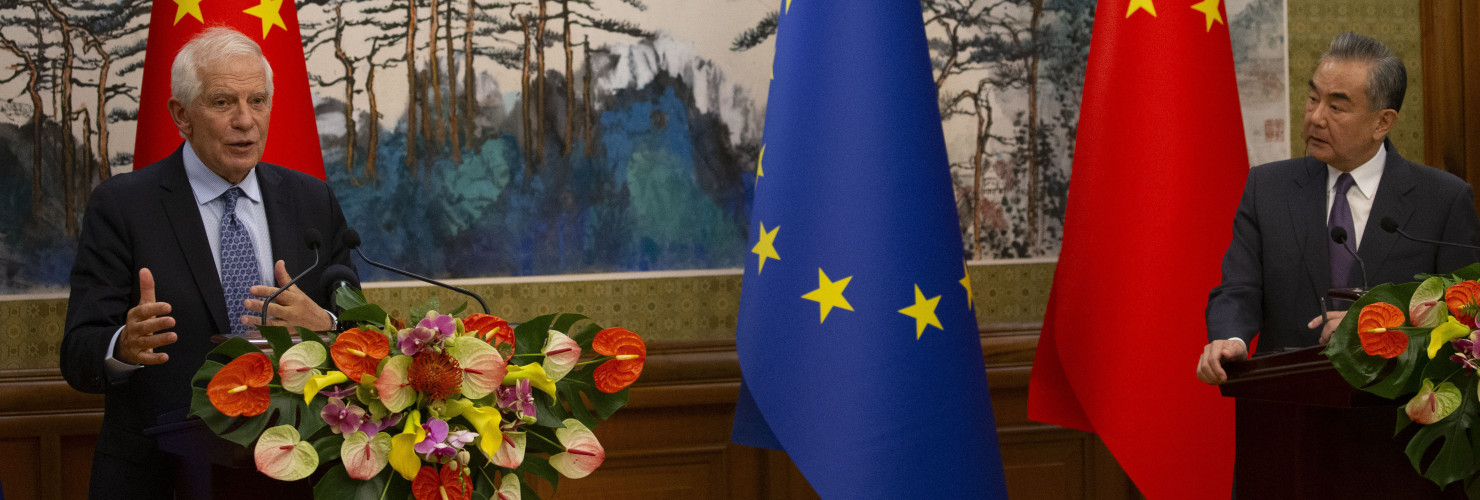

Expert opinions about EU-China relations in 2024
EU-China relations will revolve around the critical issues of technology, trade, and geopolitical alignment in 2024. The EU is grappling with the strategic implications of technology competition and China's expansive global ambitions, heightening its focus on technological interdependence, national security, and a coherent China policy across member states. Meanwhile, as China seeks to reengage with Europe amid geopolitical tensions and economic uncertainties, Europe must address trade imbalances and security concerns, particularly regarding Russia's war on Ukraine.
In this round of MERICS’ EU-China Opinion Pool, MERICS Analyst Claus Soong asked several experts:
What key issues will define EU-China relations in 2024?
Rebecca Arcesati
Lead Analyst at MERICS

Greater awareness of the geopolitical dimension of technology competition will define EU-China relations in the year ahead. More precisely, the EU is coming to grips with the role of technology in national and economic security, as well as in China’s grand strategy to advance its national interests on the international stage. This is now apparent across virtually all policy domains, from critical infrastructure protection to research and innovation, from defense to green industrial policy. Technological interdependence with China has generated opportunities, but also risks.
The European Commission of President Ursula von der Leyen is nudging member states to embrace the logic of de-risking across ten critical technology areas, starting with semiconductors, AI, quantum technology, and biotechnology. I suspect the exercise won’t be as smooth for some capitals as it will be for the more tech-savvy ones like The Hague. Technology competence in government will increasingly be a precondition for effective China policy. Moreover, some policy proposals under consideration, such as outbound investment screening, would require not only adequate technical expertise and understanding of technology markets and China’s innovation system, but also considerable resources.
Meanwhile, China and the United States are locked in a geostrategic rivalry centered on technology. While most member states share Washington’s problem diagnosis, they are neither on board with, nor equipped for emulating Biden’s capability-based approach to export controls targeting China. Finding the appropriate fora and modalities for sustainable transatlantic coordination on protective measures will be a priority, considering that the voluntary Wassenaar Arrangement on export controls for conventional weapons and dual-use items is not fit for purpose. After all, Washington has shown it has both the authority to impose unilateral measures and the political will to bear the costs.
Nicholas Bequelin
Senior Fellow at Yale Law School’s Paul Tsai China Center, and former Regional Director for Asia-Pacific at Amnesty International

“Relations between China and Europe are key to the stability of the world order and prosperity of the Eurasian continent," Xi Jinping told German Chancellor Olaf Scholz last November. If he truly meant what he said, the current state of EU-China relations will make for a very difficult 2024, as they remain stuck in an impasse.
Unfortunately for Europe, the three key factors that will shape the direction and content of the relationship this year are largely out of its hands.
The first factor is Xi Jinping himself. It is abundantly clear to anyone engaging in negotiations with Chinese counterparts that, irrespective of any internal debates within the party-state, there is only one decision-maker in terms of foreign policy, and it is Xi himself. Will China’s current economic headwinds lead Xi to conclude that the country’s economic resilience and geopolitical rivalry with the US is better served via a constructive relationship with the EU? If not, there is little hope that any issues currently on the table, from trade to security, can be resolved at the working level only.
The second factor is Putin’s determination to continue waging war in Ukraine. By far the biggest obstacle to putting EU-China relations back on the rails is Beijing’s refusal to acknowledge, even less address, the existential importance of this war to Europe. As von der Leyen (echoed by other top EU officials) has made clear, “…the way China positions itself on Russia's war will define our mutual relationship for the years to come.” China vehemently opposes the EU’s “de-risking” strategy. But it fails to see that the more it aligns itself with Moscow, the bigger a risk it appears to European leaders, and, in turn, the further the EU will be willing to push de-risking. Here, too, Xi’s personal preferences, with their manifest amity for Vladimir Putin, appear to be trumping all other considerations.
The third factor is how much Washington remains engaged in European affairs. US commitment to supporting Ukraine is already wavering, ten months before an election that could bring back a president who pledged as a candidate to “…have this war settled in one day.” Any worsening of the security situation on Europe’s Eastern flank would cause a major upset in EU priorities, and most likely mark the end of a unified European approach to China. Even without such a dramatic turn of events, the cold truth is that Europe has only found the courage to stand up to Beijing in the shadow of Washington’s aggressive – and, on its own terms, largely successful – strategy of containing China. Should the US take a more isolationist or protectionist turn, Europe would find itself isolated and scrabbling on both the security and economic fronts.
2024 already promises to be a particularly challenging year for the EU. While it has little control over the overriding factors that will affect the shape of its relationship with China, the EU can and should concentrate on what ultimately matters most: ensuring that its economy remains strong enough not be outcompeted.
Friedolin Strack
Managing Director of the Asia-Pacific Committee of German Business APA and Head of BDI’s International Markets Department

The growing EU trade deficit with China will be a focal point. The trade deficit as such is a symptom, not the problem. Germany was the world champion in exports for many years, and each export champion creates trade surpluses with most of its trading partners. The rules of the game in trade should be simple: The company with the best products, technologies and services sells best.
However, when we look into the rules of the game, we see that they are different in the EU and in China with regard to the role of the government, market access and industrial policy. In the EU, governments set framework conditions and intervene under special circumstances such as Covid-19. In China’s party-led hybrid economy, government influence is particularly strong. In the EU, we limit ourselves to World Trade Organization-compatible tariffs and restrict foreign direct investment only in critical infrastructure and areas of national security. In China, we are confronted with sectoral investment restrictions and numerous informal buy-Chinese obligations. In the EU, overcapacities in the market are a problem for individual companies. In China, they are channeled into open Western markets, most prominently the EU as the world’s second-largest consumer market.
What we will see in 2024 and beyond: On both sides we will continue to hear leading politicians speak of keeping markets open. But the more China is unwilling to systematically level the playing field, the more the EU will be forced into anti-dumping and anti-subsidy investigations and will even have to install additional defensive measures in trade and investment.
Abigaël Vasselier
Director Policy & European Affairs/Head of Program Foreign Relations

2024 will be the year of reengagement between China and Europe. With a reopening of Chinese borders, Beijing is working on attracting European leaders and companies back to China. Belgian Prime Minister De Croo already visited China at the start of 2024 and Finnish President Niinisto and Chinese President Xi spoke on a call, setting the tone and pace for European engagement this year.
In recent years, dealing with China has become a societal issue for Europeans, affecting a wide range of concerns from security to prosperity, from the digital transition to a sustainable future. The question is no longer about European interests and opportunities in China but about how China challenges European interests and its future.
Defining the scope of what Europe wants from China and what Europe wants for its own future is a priority. Rethinking this engagement as Beijing supports Russia’s war against Ukraine and amid transatlantic uncertainties over US elections is a difficult task. For some EU member states, this may leave limited space for cooperation, while others will see closer ties to China as an excellent bargaining chip that can be used in Brussels or elsewhere. It can also serve to gain individual economic benefits or to induce competition. Although Europeans have become realistic about China, if there are economic and tactical gains to be made, they will explore them. Nonetheless, every European capital would agree that keeping channels of communication open with China is a priority, not least to cooperate in solving issues from trade restrictions to incidents like the recent gas pipeline rupture by a Chinese ship in the Baltic Sea.
Among the key challenges for Europe will be maintaining the high degree of unity reached over the past two years. This means European leaders have the responsibility to be consistent in their approaches to China and to deliver coherent and coordinated messages. In a year where European elections will reshuffle the Commission, the European Council and its Presidency hold more weight.
Coherence and coordination with partners, especially those going through election cycles, are essential for Europe. Expectations are high for the Italian G7 Presidency to foster a coordinated approach of like-minded partners on China and ensure every G7 country remains focused on coherence and unity.
Gunnar Wiegand
Visiting Distinguished Fellow at the German Marshall Fund, Brussels – Visiting Professor at the College of Europe in Bruges and at the Paris School of International Affairs

Security will become much more prominent in 2024 – both military and economic security.
On military security, the EU's red line that China must not deliver weapons in support of Russia’s war effort against Ukraine is well known and officially respected; this will remain key to avoiding a substantial deterioration of EU-China relations. Of equal political importance is the explicit Chinese support for Russia’s claim that "certain states and alliances" seek to obtain military advantages to the detriment of the security of others, seriously undermining the international security order. This interpretation was first expressed when agreeing on the “limitless partnership” between Russia and China in February 2022. It was later identified by both partners as the root cause for the “Ukraine crisis” and thus the trigger for the war. In view of Russia’s unshaken determination to proceed with the war, China’s declared “neutrality” amounts de facto to justifying Russia’s blatant violation of the UN Charter and all relevant principles of the OSCE since 1990. This contradicts China's firmly expressed views on territorial integrity. China will need to distance itself from Russia denying European states the right to determine whether or not to adhere to an alliance. It will also need to clarify its stance on the EU’s new priority of Eastern European and Western Balkan enlargement.
On economic security, most of the public discussion is focused on de-risking imports and on how to deal best with Chinese exports of goods resulting from a massive overcapacity in production. With its latest package of January 24, which introduces new initiatives to strengthen economic security, the European Commission is now pursuing economic security criteria in a wider time frame, applying these notably to certain high-tech products in the areas of AI, biotechnology, advanced semiconductors and quantum computing. Following two white papers with in-depth risk assessments, future proposals are likely to include the licensing of exports and/or of outbound investments. The purpose is to protect national security against the use of certain high-tech, dual-use products, preventing them from undermining peace and security or from misuse in human rights violations. Such a proposal would be controversial but would have the key advantage of determining the EU’s own approach, based on a country-agnostic and WTO-compatible approach, and shielding member states against external influence in this critical area.
There is significant potential for bilateral EU-China escalation on both issues. Both sides need to avoid this with transparency, dialogue, clearly defined measures and reassurances.

This MERICS EU-China Opinion Pool is part of the “Dealing with a Resurgent China” (DWARC) project, which has received funding from the European Union’s Horizon Europe research and innovation programme under grant agreement number 101061700.
Views and opinions expressed are however those of the author(s) only and do not necessarily reflect those of the European Union. Neither the European Union nor the granting authority can be held responsible for them.
